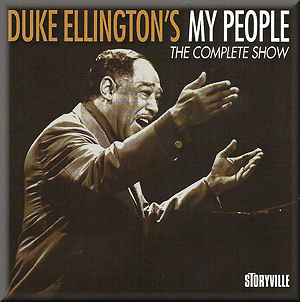1. Jungle Triangle, Pt. 1
2. Come Sunday
3. Will You Be There / 99% Won't Do
4. Ain't But The One
5. David Danced
6. Heritage (My Mother, My Father and Love), Pt. 1
7. After Bird Jungle
8. Montage
9. My People (Soap Box)
10. The Blues Ain't
11. Blues At Sundown
12. Walking and Singing the Blues
13. Working Blues
14. My Man Sends Me
15. Jail Blues
16. I Love My Lovin' Lover
17. Jungle Triangle, Pt. 2
18. King Fit the Battle of Alabam
19. King
20. Purple People
21. What Color is Virtue
22. Purple People Music
23. Piano Blues Ouverture
24. Strange Feeling
25. Heritage (My Mother, My Father and Love), Pt. 2
Duke Ellington - Director, narration
Bill Berry, Ziggy Harrell, Nat Woodard, Ray Nance - Trumpets
Britt Woodman, Booty Wood, John Sanders - Trombones
Russell Procope, Rudy Powell - Alto saxes, clarinets
Harold Ashby, Pete Clarke - Tenor saxes
Bob Freedman - Baritone sax
Jimmy Jones - Piano, conductor
Billy Strayhorn - Celeste, piano
Joe Benjamin - Bass
Louie Bellson - Drums
Emmanuel Abdul Rahim, aka Juan Amalbert - Conga
Joya Sherrill, Lil Greenwood, Jimmy McPhail, Jimmy Grissom, Irving Bunton Singers - Vocals
Bunny Briggs - Tap dancing
Richelle Le Noir Guilmenet - Narration
Duke Ellington's My People brought together several different strands from his previous career. It included extracts from his Black, Brown and Beige, which was premiered at Carnegie Hall in 1943; it contained several examples of the blues, which had been a recurrent form in Ellington's compositions; and a track like Jungle Triangle might even be said to hark back to his days accompanying the dance shows at the Cotton Club in the 1920s. Its message also looked forward to Duke's "Sacred Concerts" which were such a feature of his later years.
The show was written for the Century of Negro Progress Exposition in Chicago in 1963, and performed and recorded there. Although it has had a mixed critical reception, it laid to rest any accusations that Ellington was some sort of Uncle Tom, unwilling to speak out against the injustices of racial prejudice and segregation. In fact, by calling it "My People", the Duke was making a firm stance against such injustices - and his narration of the title-track (ironically subtitled "Soap Box") underlines his deep commitment to racial justice. Ellington often stated that his commitment to his people was clear in all his music yet, as early as a talk he gave in 1941, he asserted the importance of Black people to America's culture and democracy. And his support for Martin Luther King in King Fit the Battle of Alabam left no doubt as to his belief in civil rights.
If I am less enthusiastic about this album than many other Ellington recordings, it is partly because the majority of the tracks are vocal performances, and we hear comparatively little from the Ellington soloists. His use of singers was always patchy: sometimes using such first-class vocalists as Ivie Anderson and Adelaide Hall but also employing some second-rate singers. In fact only nine regular members of the Ellington band were used for this recording, as shortness of funds dictated the use of other musicians to fill the gaps.
The Duke himself is not heard at the piano, that role being taken by Jimmy Jones and Billy Strayhorn. But Duke wrote all the music and words, as well as writing most of the arrangements. Thankfully some key members of the band were present, such as Ray Nance and Louie Bellson. Harold Ashby gets the chance to shine in several tenor-sax solos. Bunny Briggs supplies the tap-dance sounds for David Danced, although he finds it hard to synchronise with the band.
This version of the show is taken from the recordings made in Chicago studios, checked against a tape found in Mercer Ellington's collection. It is therefore the most complete version of the show to be issued so far, in the order in which the segments were believed to have been performed. In an interview with Down Beat magazine in August 1963, Ellington described the show as contrasting the spiritual aspect of African-American life with the more down-to-earth blues, which reflected the joys and trials of work and love.
The sequence of songs doesn't entirely give the impression of how the show actually appeared on stage. Only a filmed version would have added the important ingredients of dance and staging. Highlights include David Danced (a version of Come Sunday, with powerful drumming by Louie Bellson); Ray Nance's plangent trumpet solo in Montage; Lil Greenwood's heartfelt vocals in Walking and Singing the Blues; Booty Wood's plunger-muted trombone on Working Blues; and Harold Ashby's warm tenor sax in I Love My Lovin' Lover.
It is good to have this version of My People, probably
as complete as it can ever be, although the tune titles and personnel
listings are dubious in some respects (e.g. Ain't But The One
is listed as Ain't But No One) and the sleeve-notes could
have benefited from some proof-reading. But the recording quality
is very good and the arrangements include many unique Ellingtonian
touches.
Tony Augarde
www.augardebooks.co.uk
